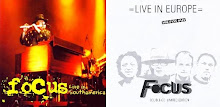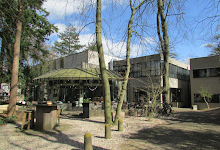Archive number: 36
Title: Out of Vesuvius
Main Album: Ship of Memories
Track number: 4
Genre: Progressive Rock Instrumental
Studio: Chipping Norton Recording Studio, 26-32 New Street, Chipping Norton, Oxon, OX7 5LJ
Length: 5' 43”
Composer: Thijs van Leer
Musicians: Jan Akkerman - Electric guitars; Thijs van Leer – Electric piano; Bert Ruiter – Bass; Pierre van der Linden – Drums
Producer: Mike Vernon
Engineer: Barry Hammond and Dave Grinsted
Label: LP – EMI, Harvest, Sire CD – EMI-Bovema, IRS, Red Bullet, JVC
Date of recording/release: Final weeks of May 1973. Not released until 1977 (LP). CD – 1988, 1993, 2001, 2006.
Notes: This third offering from the Chipping Norton sessions is an extract from music recorded as a follow up to Eruption that would later transmute into part of the Hamburger Concerto (Medium 1?). (Vesuvius is a volcano near Naples, Italy, that has erupted many times - 1944 was the last. Most famously it destroyed Pompei in 79 AD). It has a very live feel to it with little evidence of over dubbing. We begin with some atmospheric tinkling on electric piano, guitar, bass and drums [tom toms and cymbals] (00:00-00:45). After a 3 second caesura (00:46-00:48) Akkerman breaks in with a wailing guitar and then leads a slightly lumbering band through the first part of the number (00:49-03:44). Overlapping with the end of Akkerman's lead van Leer then takes things up on electric piano (03:45-05:43) to the fade. The electric piano is not an instrument used elsewhere by Focus.
A note on the electric piano (from Wikipedia)
An electric piano is an electric musical instrument. They began to be popular in the late sixties and were at the height of their popularity in the seventies but are still used today. Many models were designed for home or school use or to replace a (heavy) and un-amplified piano on stage, while others were originally conceived for use in school or college piano labs for the simultaneous tuition of several students using headphones. Unlike a synthesiser, the electric piano is not an electronic instrument, but electro-mechanical. Electric pianos produce sounds mechanically and the sounds are turned into electronic signals by pickups.
The earliest electric pianos were invented in the late twenties; the 1929 Neo-Bechstein electric grand piano was among the first. Probably the earliest stringless model was Lloyd-Loar's Vivi-Tone Clavier.
Van Leer's preferred instrument was the distinctive Fender Rhodes model. The first one was produced in 1965. The Rhodes' action is quite different from that of a conventional piano. Whereas in a conventional piano each key causes the hammers to strike sets of strings, in a Rhodes piano the hammers strike tines instead. The result is a unique, fat sound with a bellish attack and good sustain. Since 1974 the Fender name has been dropped and just Rhodes has been used.





















No comments:
Post a Comment